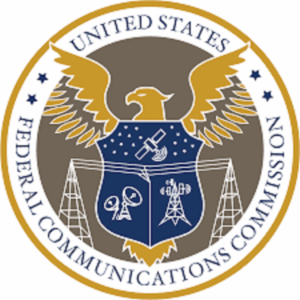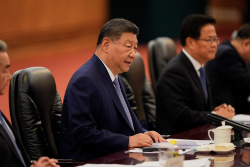 FCC
FCC The Trump Administration Federal Communications Commission's (FCC) recent efforts to intimidate broadcasters into taking anti-Trump comedians off the air are blatant violations of the First Amendment. They also lend weight to longstanding libertarian arguments for abolishing the FCC.
FCC Chair Brendan Carr threatened to pull ABC's broadcast license unless it stopped broadcasting comedian Jimmy Kimmel's show (which ABC quickly did). Earlier, the FCC similarly threatened CBS, which then canceled Stephen Colbert's show (Colbert is another anti-Trump comedian). Trump now threatens to use similar tactics against other broadcasters who air shows that attack him.
Robert Corn-Revere, electronic media expert with FIRE, has a helpful analysis of the reasons why such attentions are unconstitutional. As he notes, just last year, in NRA v. Vullo, the Supreme Court unanimously reiterated the principle that "the First Amendment prohibits government officials from relying on the threat of invoking legal sanctions and other means of coercion . . . to achieve the suppression of disfavored speech."[quotations omitted]. In Vullo, the Supreme Court struck New York officials efforts to coerce the NRA into curbing its pro-gun rights speech, at the behest of liberal Democratic Gov. Andrew Cuomo. That reasoning applies to Trump and Carr, as well. If anything, their unconstitutional motives are even more blatant than Cuomo's were.
If the Trump FCC targets more broadcasters, hopefully they will sue and win. But there is a deeper problem here: an agency that has broad power to grand or deny licenses to broadcasters is an inherent danger to freedom of speech. That's especially true officials hides their unconstitutional motives more carefully hidden than Trump and Carr have done.
This is not a new problem. Only a few years after the establishment of the FCC in 1934, Franklin D. Roosevelt used the agency to target conservative broadcasters opposed to his New Deal. Later John F. Kennedy and Lyndon Johnson used the "Fairness Doctrine" - developed by the FCC as part of its regulatory authority - to target critics of their policies. The Fairness Doctrine continued to be as a tool to restrict speech until the Reagan FCC got rid of it in 1987.
Until now, recent presidents have not used the FCC as abusively as FDR, JFK, and LBJ did. But the danger remained, and Trump is now exploiting it. Even if open attempts at censorship are struck down the courts, the FCC can still intimidate broadcasters by using its powers to deny and grant licenses, restrict mergers, and the like, citing seemingly neutral pretexts. Fear of such action may be why ABC and CBS have - so far - chosen not to go to court.
In his classic 1959 article, "The Federal Communications Commission," the great libertarian economist Ronald Coase warned of this danger, and advocated the abolition of the FCC (Coase later won the Nobel Prize in Economics in part for this work):
The situation in the American broadcasting industry is not essentially different in character from that which would be found if a commission appointed by the federal government had the task of selecting those who were to be allowed to publish newspapers and periodicals in each city, town, and village of the United States. A proposal to do this would, of course, be rejected out of hand as inconsistent with the doctrine of freedom of the press. But the broadcasting industry is a source of news and opinion of comparable importance with newspapers or books and, in fact, nowadays is commonly included with the press, so far as the doctrine of freedom of the press is concerned.
If newspapers and magazines had to be licensed by the government before being allowed to publish, there would be obvious opportunities for favoritism and abuse. The exact same danger exists with broadcast licensing.
The standard rationale for broadcast licensing by the state is that broadcast frequencies are scarce resources that government must protect from "interference." If two networks try to broadcast on the same frequency, chaos might ensue and neither would be effectively transmitted. But the same is true of traditional media. Printing presses, ink, and other production supplies are also valuable scarce goods. Two newspapers cannot use the same printing press at the same time, or print their publications on the same pieces of paper. Yet rightly rely on markets and private property rights, not government licensing and central planning, to allocate these resources.
As Coase explained, the same system of property rights can work with broadcast frequencies. Let private broadcasters own individual frequencies, and let free exchange and market competition decide who uses which one.
This solution is even better with the rise of cable television and then internet broadcasting. No longer is it plausible to argue that a fully private system would be dominated by just a handful of major networks, as was perhaps true in the pre-cable age. Owners of individual broadcast networks, radio stations, and websites can decide what viewpoints they want to platform. Market forces will incentivize new entrants to promote viewpoints that incumbents neglect, but audiences might like to see. We have seen how right-wing networks like Fox and Newsmax arose to challenge more liberal traditional media. More recently, there is no shortage of websites (including social media sites) espousing a range of different ideologies. Elon Musk's generally right-wing Twitter/X site, for example, contrasts with more left-wing Bluesky (among others). I am one of many users who have accounts on both.
I oppose Musk's politics and disapprove of many of his policies for managing X. I don't always love everything that goes on at Bluesky either. But I support both sites' rights to manage the speech on their property without government interference.
This market system isn't perfect. I myself have long argued that consumers do a poor job of acquiring and processing political information, in part because they have bad incentives. That applies to our consumption of both traditional broadcast media, and more recent internet and social media products. But market competition and private property are far preferable to allowing the FCC to decided who gets a license, and to intimidate critics of the incumbent president into submission or self-censorship.
Elsewhere, I have assessed a number of possible approaches to dealing with the problems of misinformation and political ignorance. There is no easy answer, though some options are potentially promising. Letting the FCC intimidate and coerce broadcasters isn't one of them. It's long past time to recognize that Ronald Coase was right, and the FCC should be abolished.
The post Abolish the FCC appeared first on Reason.com.













 Bengali (Bangladesh) ·
Bengali (Bangladesh) ·  English (United States) ·
English (United States) ·